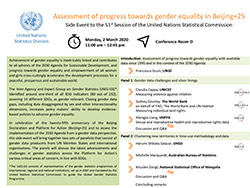United Nations Statistical Commission
Overview 51st Session (2020) Side Events
Assessment of progress towards
gender equality in Beijing+25
- Monday, 2 MAR 2020
- 11:00 am – 12:45 pm
- Conference Room D
Meeting organized by United Nations Statistics Division
Achievement of gender equality is inextricably linked and contributes to all spheres of the 2030 Agenda for Sustainable Development, and progress towards gender equality and empowerment of all women and girls cross-cuttingly accelerates the development processes for a peaceful, prosperous and sustainable world.
The Inter-Agency and Expert Group on Gender Statistics (IAEG-GS)* identified around one-third of all SDG indicators (80 out of 232), covering 14 different SDGs, as gender-relevant. Closing gender data gaps, including data disaggregated by sex and other intersectionality dimensions, increases policy makers' ability to develop evidencebased policies to advance gender equality.
In celebration of the twenty-fifth anniversary of the Beijing Declaration and Platform for Action (Beijing+25) and to assess the implementation of the 2030 Agenda from a gender data perspective, this side-event will bring together two sets of panelists that consist of gender data producers from UN Member States and international organizations. The panels will discuss the latest advancements and challenges in gender statistics across the Platform for Action's various critical areas of concern, in line with SDGs.
*The IAEG-GS consists of representatives of the gender statistics programmes of international, regional and national institutions, set up in 2007 and mandated by the United Nations Statistical Commission to guide the Global Gender Statistics Programme.
-
Introduction: Assessment of progress towards gender equality with available data since 1995 and in the context of the 2030 Agenda
Francesca Grum, UNSD -
Panel 1: Gender data challenges and silver linings
SDG 5.2, 16.2 Claudia Cappa, UNICEF
Measuring violence against children SDG 1.4, 5.a Sydney Gourlay, The World Bank on behalf of FAO, The World Bank and UN-Habitat
Measuring individual land rights SDG 5.6 Mengjia Liang, UNFPA
Sexual and reproductive health and reproductive rights data - Discussion and Q&A
-
Panel 2: Chartering new territories in time-use methodology and data
SDG 5.4 Harumi Shibata Salazar, UNSD Michelle Marquardt, Australian Bureau of Statistics Khuslen Zorigt, National Statistical Office of Mongolia -
Discussion and Q&A
Concluding remarks
